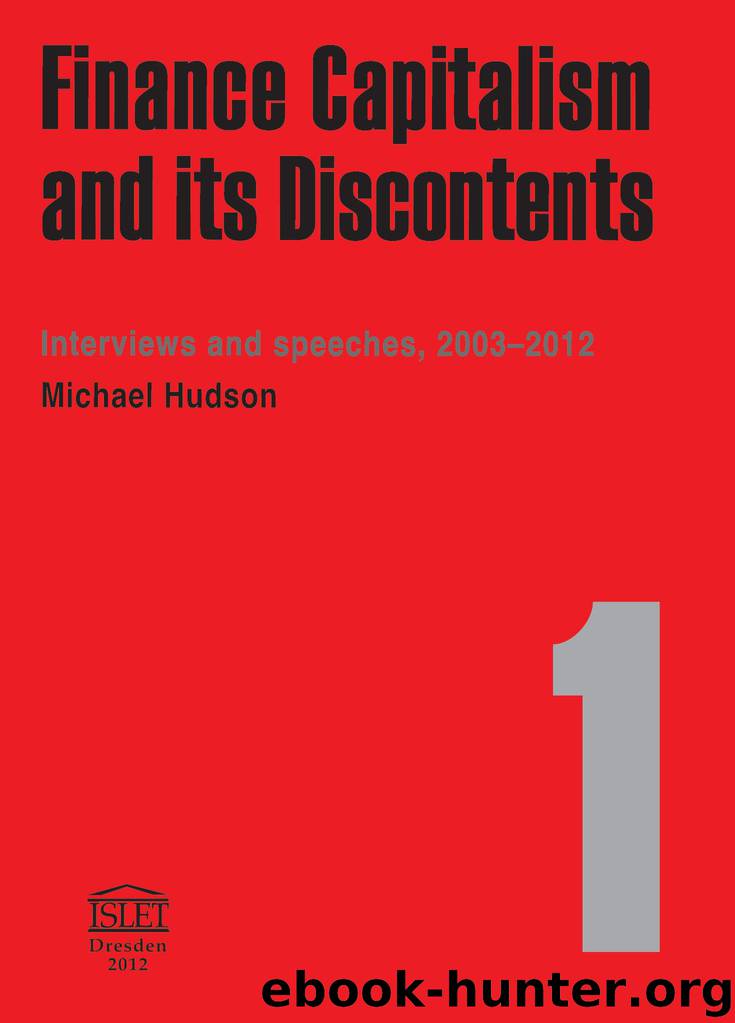FINANCE CAPITALISM AND ITS DISCONTENTS by Hudson Michael

Author:Hudson, Michael [Hudson, Michael]
Language: eng
Format: epub
Publisher: ISLET
Published: 2013-05-20T00:00:00+00:00
Q: So a great finance-capital innovation was established by the Soviets themselves. Did they realize what they were dong? And by trying to evade U.S. control, did they end up helping or hurting U.S. global interests?
A: Nobody grasped the implications at first. As so often happens, this financial innovation bred a train of unanticipated consequences. U.S. multinationals found it helpful to hold dollars offshore to facilitate their own transactions, especially as they began to buy European and other foreign firms and establish their own overseas branches.
U.S. banks set up branches in London and other money centers to serve these companies. When monetary policy was tightened during the Vietnam War years, these banks found the easiest supply of money to come from their foreign branches. Bank regulatory agencies had not foreseen this development, and had not imposed any requirement that head offices set aside reserves against the deposits that came from these foreign branches. So Eurodollar deposits became a great source of deposits for the large international U.S. banks to lend out when money was getting tight as a result of the Vietnam War’s balance-of-payments drain.
Q: What was the most remarkable experience you had with these institutions?
A: The Vietnam War was pushing the balance of payments into deficit, draining the gold supply that backed the currency. Gold had been America’s lever of international financial power since World War I, and now it was flowing out to pay for the war in Southeast Asia.
The Johnson and Nixon administrations knew that if fighting the war meant less consumption at home, voters would oppose the war. So they pursued a guns-and-butter policy, promoting heavy domestic consumption and deficit spending, leaving little to sell abroad. The United States was not willing to permit key economic sectors to be sold to foreigners to balance its international payments, although this is what it directed other debtor countries to do after 1980.
U.S. officials sought to attract foreign exchange in any way they could, but their options were limited. One great possibility remained: attract foreign flight capital. This could be done without raising interest rates at home, but providing a safe haven for foreign hot money. Therefore, what U.S. geopolitical strategists were willing to accept were foreign bank deposits, regardless of where they came from.
In balance-of-payments terms, foreign money being converted into dollars and kept in foreign branches of U.S. banks would do just as well as money in U.S. banks, as long as these deposits were held in dollars rather than in foreign currency.
Q: Was this an explicit policy?
A: Pretty explicit. This was at a time when so much hot money was going to Switzerland that its franc was becoming the world’s hardest currency. American financial strategists sought a policy to support the dollar in much the same way. The State Dept. and Treasury approached the nation’s leading international banks with a proposal to do something that they would have feared to do without official inducement. They were to establish and expand their own branches in the world’s major capital-flight centers—and perhaps to help establish some new ones.
Download
This site does not store any files on its server. We only index and link to content provided by other sites. Please contact the content providers to delete copyright contents if any and email us, we'll remove relevant links or contents immediately.
International Integration of the Brazilian Economy by Elias C. Grivoyannis(111061)
The Radium Girls by Kate Moore(12030)
Turbulence by E. J. Noyes(8053)
Nudge - Improving Decisions about Health, Wealth, and Happiness by Thaler Sunstein(7709)
The Black Swan by Nassim Nicholas Taleb(7132)
Rich Dad Poor Dad by Robert T. Kiyosaki(6637)
Pioneering Portfolio Management by David F. Swensen(6302)
Man-made Catastrophes and Risk Information Concealment by Dmitry Chernov & Didier Sornette(6020)
Zero to One by Peter Thiel(5802)
Secrecy World by Jake Bernstein(4753)
Millionaire: The Philanderer, Gambler, and Duelist Who Invented Modern Finance by Janet Gleeson(4479)
The Age of Surveillance Capitalism by Shoshana Zuboff(4300)
Skin in the Game by Nassim Nicholas Taleb(4250)
The Money Culture by Michael Lewis(4209)
Bullshit Jobs by David Graeber(4193)
Skin in the Game: Hidden Asymmetries in Daily Life by Nassim Nicholas Taleb(4007)
The Dhandho Investor by Mohnish Pabrai(3768)
The Wisdom of Finance by Mihir Desai(3749)
Blockchain Basics by Daniel Drescher(3583)
